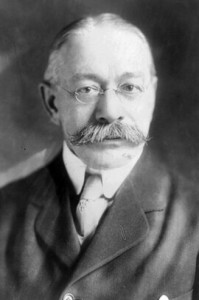 On October 4 and 5, 2012, the Law School held its Conference on America’s First National Crime Commission and the Federalization of Law Enforcement. The conference was the brain child of Dean Strang, a member of our adjunct faculty, who was assisted in its planning by Professor Michael O’Hear and me. Attracting large audiences of academics, lawyers, students, and the public, the conference featured lectures by historians, law professors, political scientists, and criminal justice experts.
On October 4 and 5, 2012, the Law School held its Conference on America’s First National Crime Commission and the Federalization of Law Enforcement. The conference was the brain child of Dean Strang, a member of our adjunct faculty, who was assisted in its planning by Professor Michael O’Hear and me. Attracting large audiences of academics, lawyers, students, and the public, the conference featured lectures by historians, law professors, political scientists, and criminal justice experts.
The conference began with Professor Frank Zimring’s (Berkeley, Law) lecture, “The Accident Crime Commission: Its Legacies and Lessons,” which was delivered under the auspices of the Law School’s Barrock lecture in criminal law. Professor Zimring provided historical insight into the composition, work, and legacy of the so-called Wickersham Commission. His lecture is summarized here.
On October 5 the conference continued with three panels. The first panel provided additional historical perspective on the Wickersham Commission. Delivering papers were James Calder (Texas-San Antonio, Political Science), who placed the Commission’s work in a paradigm of “brain” and “state.” Samuel Walker (Nebraska-Omaha, Criminology) provided an overview of President Herbert Hoover’s life, emphasizing how his support for the Commission was fully consistent with his role as an early twentieth-century Progressive. John M. Cooper, Jr., (Wisconsin, History) commented on the papers while offering additional insights into President Hoover’s progressivism.
The second panel focused more specifically on the problems of police and prosecution that the Wickersham Commission had highlighted. Beverly Gage (Yale, History) addressed J. Edgar Hoover’s campaign to control national crime statistics through the FBI. Rachel Harmon (Virginia, Law) focused on the Commission’s “Report on Lawlessness in Law Enforcement,” one of fourteen reports. The Report’s surprising conclusion stressed political solutions, “the will of the community,” as the “real remedy” to abuses such as the infamous third-degree. Ronald Wright’s (Wake Forest, Law) paper examined the Commission’s work within the context of longstanding local control of the prosecution and defense function. The Commission supported greater control at the state level based, in part, on linkage between local control and political corruption. Commentary on the panel 2 presentations was provided by Tracey Meares (Yale, Law), who skillfully weaved together common themes found in all three papers.
The third panel offered three very different perspectives on the Commission’s legacies. Walter Dickey (Wisconsin, Law) observed that even today too little knowledge is disseminated about the effectiveness of the criminal justice system. Judges, for example, are not apprised of how their sentences are being carried out by the corrections department. Michal Belknap (Cal. Western and San Diego, Law and History) addressed the federalization of criminal law by recounting the prosecution of Communists in the 1950s. Athan Theoharis’s (Marquette, History) paper explored the evolution of a “security consensus” by looking at events before and after Wickersham, namely, the establishment of what would become the FBI in 1908 and the 1968 Omnibus Crime Control and Safe Streets Act.
We look forward to publications of the conference papers, including Professor Zimring’s Barrock lecture, next spring in the Marquette Law Review. Professor O’Hear and I appreciate the work by our distinguished presenters and commentators as well as the audience’s interest in the conference.

